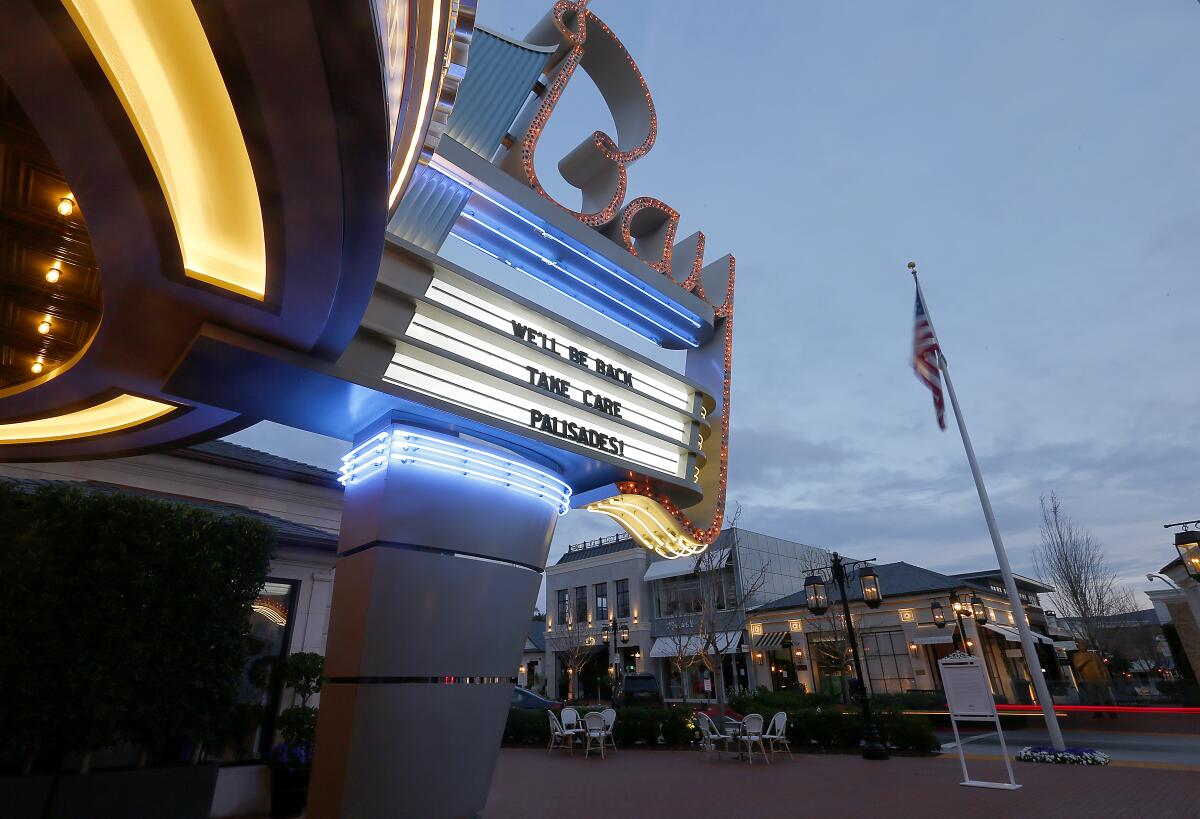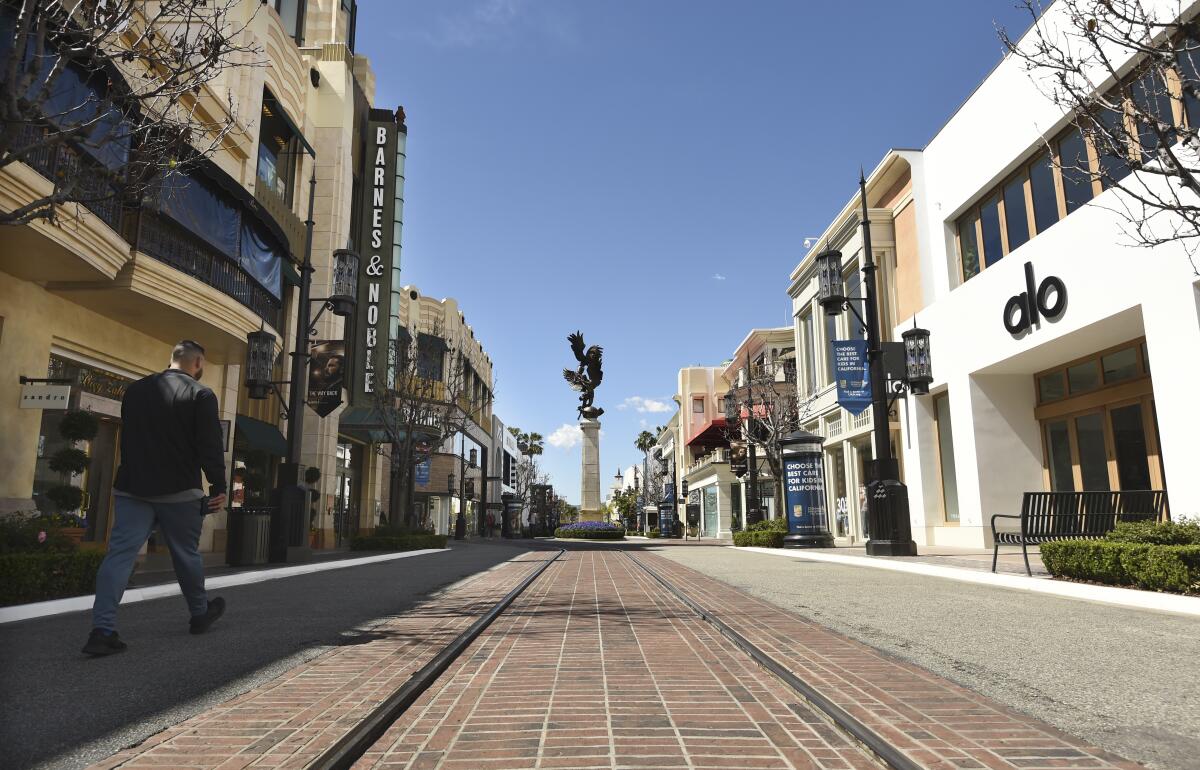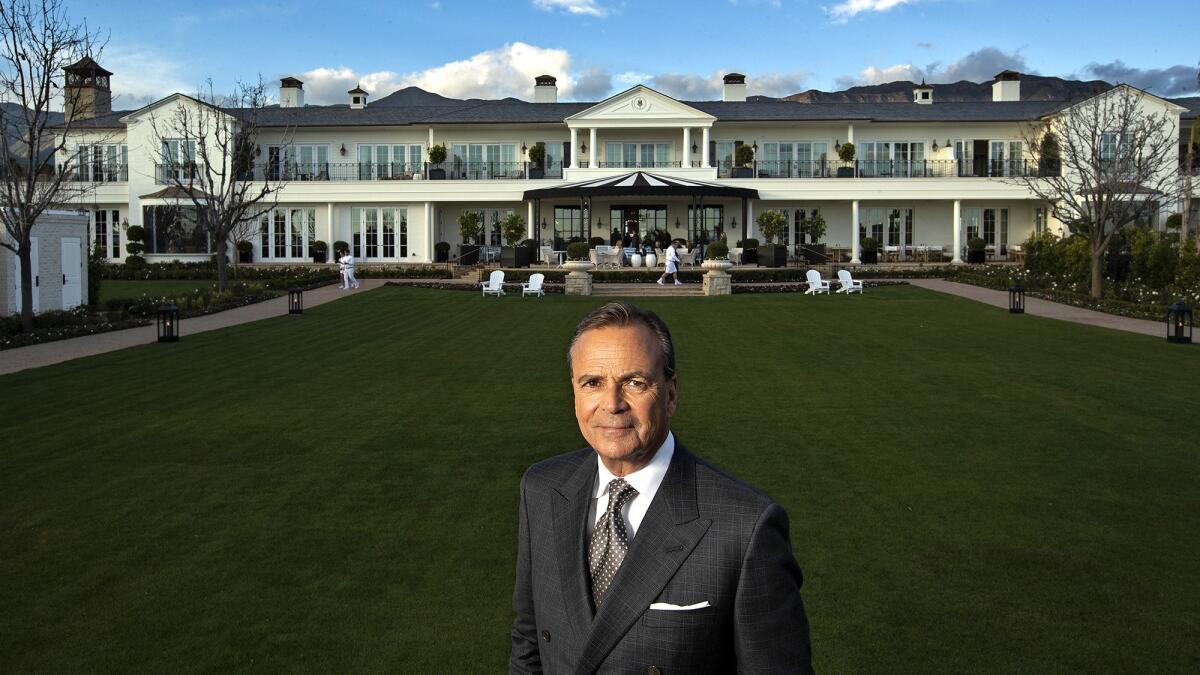This is what your next trip to the Grove or Americana will look like

- Share via
Rick Caruso, owner of the upscale Grove shopping center in Los Angeles and luxury Rosewood Miramar Beach resort in Montecito, has developed coronavirus-fighting procedures for reopening his properties that are nearly as over-the-top as the properties themselves.
At his 10 malls in the Los Angeles area, expect to encounter “physical distancing ambassadors” to keep crowds from forming and attendants who clean every bathroom stall after it’s used. Shields between guests and concierges will be in, while valet parking and shoe shines will be out.
The picturesque trolleys that offered visitors rides around the Grove and Americana at Brand in Glendale will stay in their garages indefinitely. Workers’ temperatures will be checked daily, and hotel staff must pass through a “foot bath” to make sure they are not tracking in a virus on their shoes.

Elevator occupancy will be limited to one family, or household, per car at a time. And everyone who steps on a Caruso property must wear a mask.
“It’s a small price we have to pay to get back together,” said Caruso, who now considers his mask “part of the daily uniform.”
Caruso is uncertain when he will be able to fully reopen his properties, but he just released the detailed safety standards that his company has been working on since March.
His outdoor malls, such as Palisades Village, are still open to strolling visitors even though the majority of stores are closed and restaurants serve take-out only. The Miramar only takes in essential workers such as healthcare and emergency service providers.
The COVID-19 shutdown has been agonizing, Caruso said, and was at first “unimaginable” for businesses. But he believes the pathway to recovery lies in giving people a sense of security as they venture back to favored haunts.
“The world has changed, and it is never going back,” Caruso said. “Companies have to change with it” and adapt to new customer preferences more sharply focused on their physical well-being.
Perhaps not surprisingly, that starts with having peace of mind about using a shared bathroom, Bay Area real estate consultant David Greensfelder said.
“Public restrooms are probably the biggest single issue to get people back out in public,” said Greensfelder, managing principal of Greensfelder Commercial Real Estate.
When restrooms reopen at Caruso’s malls, an attendant will be present during all operating hours to clean stalls after each use and make sure that no more than 50% of them are occupied at any given time. Terrycloth hand towels will be replaced with disposable towels, and directional floor decals will be applied to ensure proper flow of foot traffic.
In a switch from previous procedures, cleaning at the malls may be as flamboyantly executed as the dancing fountains surrounding a tall gold statue at the Americana.
“We used to make sure no one saw it being cleaned,” said Caruso, who wanted guests to encounter a company mall looking new, “like it just came out of the box.”
Now, he said, “we want cleaning people to be visible and out there all day long.”
Electrostatic misting machines, which are nontoxic-disinfectant sprayers, will be used in all areas of the properties, including at least twice daily in high-touchpoint areas.

At the Miramar, public areas will be sanitized hourly. Housekeepers will use a minimum of four different color-coded microfiber cloths each time they clean a guest room. Ultraviolet-light air purifiers have been installed in the heating and air conditioning systems in the main building that bring in only outside air instead of recycling it.
Such measures might have seemed extreme a few months ago, but now “the over-the-topness of it is really good” for reducing people’s anxiety, said Greensfelder, who does not work for Caruso.
“There is an ambient stress level that everyone is trying to cope with,” he said. “Figuring out how we are going to function in common areas is the key to reopening real estate.”
Upgraded cleaning is costly, however, and in a mall such operating costs are usually passed on to tenants, Greensfelder said. “Is the expense of it sustainable if tenants are seeing their sales hit and their costs go up?”
Caruso acknowledged that operating expenses would go up, without specifying by how much, but said his company would “absorb a lot of these costs for the smaller tenants” and added that his company was not collecting rent from smaller tenants while their businesses were shut down. Larger, national tenants, however, are expected to pay rent and operating expenses.
Caruso said he would have a full-time nurse on staff at his company to make sure proper health safety protocols were being followed, and the new standards were drawn up with the guidance of epidemiologist Neha Nanda, medical director of infection prevention at Keck Medicine of USC.
“If there’s one thing we’ve learned from this pandemic, it is the importance of changing and adapting quickly to the ever-evolving environment,” Nanda said.
“Over the last few months, we have all made unimaginable sacrifice,” she said. “We should not let our collective actions go to waste as we need to double down on our efforts to allow the economy to safely reopen in partnership with the medical community.”
Caruso described the shutdown as “probably the most complicated, taxing challenge that I have ever been through in business,” forcing his company into “survival mode” as its revenues dropped to almost zero while expenses remained.
He said he was optimistic, however, that shoppers would want to return to his malls in part because they’re outdoors, where viruses are less likely to spread. The Grove was one of the region’s top tourist attractions before the pandemic hit.
“The minute we say come on back, I think people are going to come back,” he said. “The challenge for us is managing the crowd so we can observe all the right protocols. It might be the first time in history we turn people away.”
More to Read
Inside the business of entertainment
The Wide Shot brings you news, analysis and insights on everything from streaming wars to production — and what it all means for the future.
You may occasionally receive promotional content from the Los Angeles Times.











